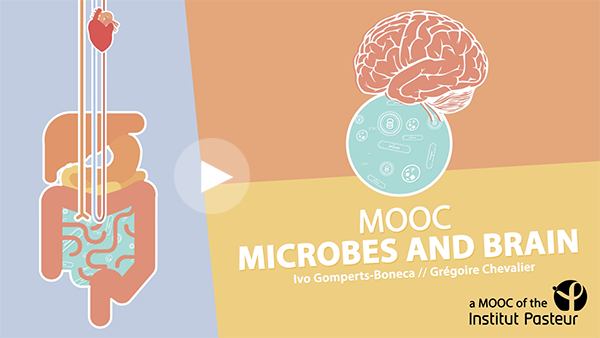LANGUAGE: ENGLISH SUBTITLED IN FRENCH AND IN ENGLISH
Even though research focused initially on the influence of our microbiota on immunity and metabolism, more and more evidence suggest that these microbes impact many different brain functions and could be potentially involved in several neuropathologies. Finally, our gut harbors also the second most important population of neurons after the central nervous system: the enteric nervous system.
In this MOOC, we will cover all the aspects of the interactions between microbes and the nervous system, starting from an infectious perspective to explore the role of our microbiota in brain functions and potentially neurologic disorders. All along the chapters, you will see how microbes, historically thought as harmful threats, are actually constantly shaping who we are by communicating with our brain.
Format
This MOOC is organized in 5 weeks. Each week is composed of 4 to 6 sequences. In each sequence, you will find a 10 minute video and a multiple choice test to help students check their understanding. The videos are in English subtitled in French and in English. All the tests are in English.
Prerequisites
This MOOC is aimed at people interested in understanding the complex interactions between microbes and our nervous system, especially our brain.
A bachelor of science is recommended to follow this MOOC.
Teachers
This MOOC is codirected by Ivo Boneca, head of the Biology and Genetics of Bacterial Cell Wall research unit at the Institut Pasteur and by Grégoire Chevalier, researcher at the Institut Pasteur, working on the interactions between microbiota and the host.
With the participation of:
- Alain BESSIS (ENS Paris)
- Morgane BESSON (Institut Pasteur)
- Hervé BOUHRY (Institut Pasteur)
- John BIENENSTOCK (McMaster University)
- Jean-Marc CAVAILLON (Institut Pasteur)
- Gérard CLARCK (UCC Cork)
- Pierre-Olivier COURAUD (Institut Cochin)
- Robert DANTZER (University of Texas)
- Gérard EBERL (Institut Pasteur)
- Sergueï FETISSOV (Inserm)
- Ilana GABANYI (Institut Pasteur)
- Laure GUENIN-MACE (Institut Pasteur)
- Monique LAFON (Institut Pasteur)
- Martin LARSEN (CIMI Paris)
- Marc LECUIT (Institut Pasteur)
- Gabriel LEPOUSEZ (Institut Pasteur)
- Daniel MUCIDA (Rockefeller University)
- Nathalie PARDIGON (Institut Pasteur)
- Maud PASCAL (Institut Pasteur)
- Anura RAMBUKKANA (University of Edimburgh)
- Damien REI (Institut Pasteur)
- Julien ROYET (IBDM - Institut de Biologie du Développement de Marseille)
- Tarek SHARSHAR (Institut Pasteur)
- Nathalie VERGNOLLES (Institut de recherche en santé digestive)
Program, evaluation and registration on the FUN platform (France université numérique)
Week 1: Microbes & infection
- Bacterial meningitis
- Neuroinfection by rabies
- Neuroinfection by zika
- Inflammatory Response Syndrome
- Neuroprotection
Week 2: Microbes & brain development
- Microbiota, Immunity and CNS
- Role of microbiota in Drosophila brain development
- Microglial development: potential role of microbiota
- Microbes & BBB
- Aging & microbiota
Week 3: Microbes & brain functions
- Microbiota & neuropsychiatry
- Stress, depression & microbiota
- Microbiota & energy balance/anorexia
- Microbes & sleep
- Vagus nerve, a gut-brain communication pathway
Week 4: Microbes & neuropathologies
- Addiction & microbiota
- Neuroinflammation and cognitive decline
- Neuroinflammation & depression
- Microbiota & MS
Week 5: Microbes & peripheral nervous system
- Neuroimmune interactions in the gut
- Adaptation of the immune cells to the intestine
- Probiotics & nervous system
- Microbiota & visceral pain
- Mycolactone & pain
- M. leprae & peripheral nervous system reprograming



